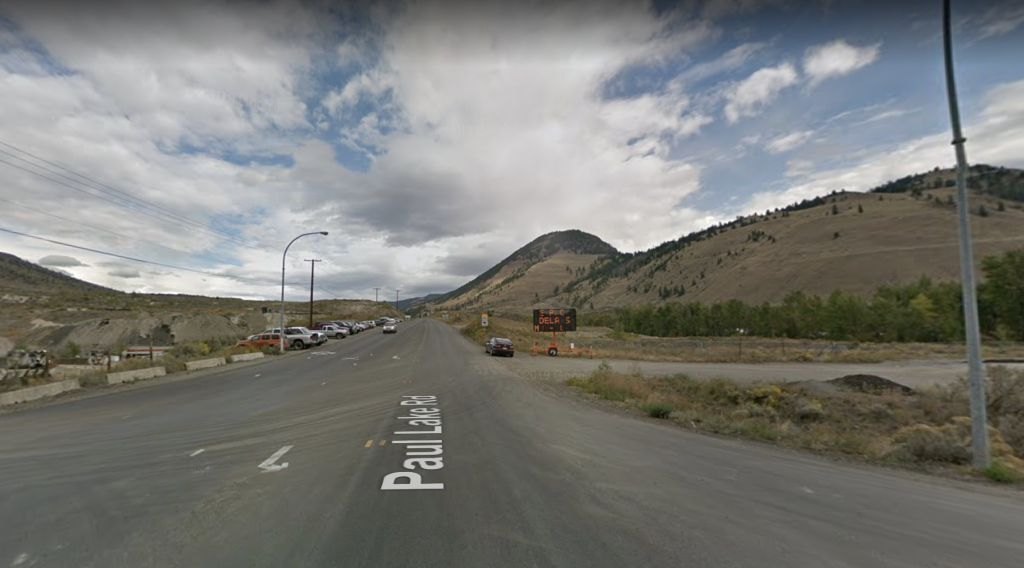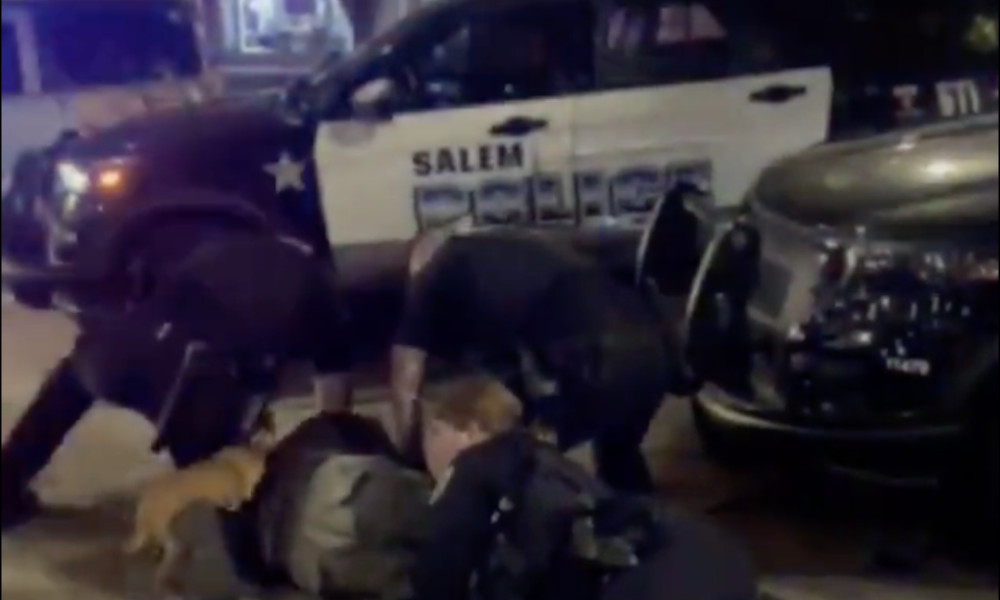Salem police officer Jonathan McNichols approached Peter Leonard on a Thursday night under the gold-lit sign outside the Elsinore Theatre.
Until that night in September, the downtown area of Northeast High and State streets was home for Leonard, at least for some time. How long, no one knows.
Leonard, 40, for months could be seen sitting with his small dog in his lap, often against the stained white brick walls of the Key Bank building on State Street. In brief conversations with passersby, his demeanor appeared benign but his thoughts paranoid. He would warn them of wrongdoing in the community, while showing signs of apparent mental illness.
That night of Sept. 8, McNichols noticed as he approached that Leonard may have been having a mental health crisis, according to police reports. In such cases, Salem Police Department policy calls for officers to de-escalate the situation if possible.
But McNichols didn’t do that. Records show the officer dismissed warning signs of Leonard’s mental instability and ignored his agency’s policy on responding to people in crisis, instead seeking to detain Leonard.
That triggered a confrontation resulting in Leonard’s hospitalization — and then time in the Marion County Jail, according to a Salem Reporter investigation.
The Leonard arrest is another episode of Salem police confronting mentally ill people in need of help. Public agencies have increasingly refined policies and worked to find ways to deal with volatile encounters with people in crisis. But they are a mounting challenge for the community as mental health services remain constrained.
Police had responded to a report that Leonard was trespassing in front of the theater and “verbally harassing patrons as they left the building,” McNichols wrote in an affidavit.
The officer reported he approached Leonard and asked him to identify himself. Leonard said his name was Strike Liner.
McNichols several times asked Leonard his legal name, to which he responded the same.
“Dispatch was unable to locate him under that name,” McNichols wrote in his affidavit.
“McNichols explained to Peter that if he did not properly identify himself, he would place him in handcuffs and (he) would be taken to the Salem Police Department for fingerprinting,” according to an account provided by McNichols during an interview with another officer over his use of force.
What followed is documented in police reports, which describe an altercation between Leonard and up to five Salem officers.
A 77-second video also surfaced on social media the following day which shows officers restraining Leonard on the sidewalk, using a Taser and sneering at bystanders as his dog whimpers and leaps around officers’ feet.
The video doesn’t capture what led officers to restrain Leonard and ends before he is handcuffed.
Based on medics’ recommendation, Leonard was taken to Salem Hospital “due to being hit in the head,” a police report said.
He eventually received “clearance” for jail and was booked the following morning, on Sept. 9. He was charged in Marion County Circuit Court that same day with attempting to assault a public safety officer and resisting arrest, according to court records.
Leonard was released from jail Sept. 13. But Salemites who recognized him on High and State streets won’t find him there.

OFF THE GRID
In late October 2021, a small rural unit of the Royal Mounted Canadian Police asked for the public’s help in finding a man missing from Kamloops, British Columbia.
“Peter Joseph Leonard has not had contact with his family for quite some time and they are concerned for his well being,” the Tk’emlúps Rural RCMP Detachment wrote in a statement at the time. “Mr. Leonard lives a transient lifestyle and recent attempts by police to locate him have been unsuccessful.”
According to the Canadian agency, Leonard owned a silver Subaru Forester with British Columbia plates, which hadn’t been found either.
Jimmy Jones, executive director of the Mid-Willamette Valley Community Action Agency, said Salem being in the middle of one of America’s great highways has made it a landing spot for some people experiencing mental illness and homelessness.
“I-5 stretches from San Diego all the way up to Canada,” Jones said. “People who are struggling, frequently they’ll just travel up and down the interstate. Sometimes they’ll wander into local communities.”
The last possible sighting of Leonard was in summer 2021 near Paul Lake Road.
The highway, surrounded by mountains and sagebrush, stretches across Kamloops Indian Reserve No. 1.
The local police said Leonard was known to frequent the area, along with Highway 5 and Chief Louis Way.
That area is a long way from Salem, about 511 miles.
It wasn’t until more than a year after his last sighting that Leonard came on the radar of Salem authorities.

SCUFFLE DOWNTOWN
The Salem police found Leonard, but they weren’t looking for a missing person.
At no point, it appears, did Salem police learn anyone was looking for him north of the border.
The first call to emergency dispatchers the night of Sept. 8 came in as a disturbance at the Elsinore Theatre. On the bill that evening was blues artist Tab Benoit.
A dispatcher relayed the call at 10:19 p.m., “Two males yelling and cussing at each other.” Then one minute later, “Yelling appeared threatening. No weapons seen.”
A second caller, who was a theater employee, reported that a “transient male is harassing customers, yelling at them and being confrontational,” according to a Salem police report.
Angela Hedrick, Salem police spokeswoman, wrote in a statement Wednesday that the caller described the man as “making verbal threats of violence toward his customers.”
The caller said the man was drinking and had an open container, records show. He also had a chihuahua on a leash.
The first Salem officer to contact Leonard that night was Jonathan McNichols, who arrived about three minutes after the initial call. Records show at least one other officer was also on the way.
McNichols asked Leonard for his name.
“Ofc. McNichols mentioned that Peter appeared to be EDP as he was mumbling to himself and would randomly change his topic of conversation,” Salem officer Kyle Felix wrote in a report four days later.
EDP refers to an “emotionally disturbed person,” according to department policy, one whose behaviors potentially indicate they are in crisis — with “special emphasis” on behaviors that suggest potential violence or danger.
Leonard was showing what Salem police policies describe as signs of being in a mental health crisis, including “inability to focus,” confusion, and “the trigger of a ‘freeze, fight, or flight’ response.”
Salem officers should cite and release such a person if they have committed a class C felony or a less serious crime, the policy says. McNichols suspected Leonard of second-degree trespassing, a class C misdemeanor.
In such instances, officers should take the person into custody on a civil “peace officer hold” when there is probable cause to believe they are a danger to themselves or anyone else. They are to be taken to the hospital or other treatment facility.
“The ideal resolution for a crisis incident is the subject is connected with resources which can provide long-term stabilizing support,” the policy says. “When police officers need to engage with a subject in behavioral crisis, the Salem Police Department’s expectation is that they will attempt to de-escalate the situation, when feasible and reasonable.”
Nothing prior to the physical altercation compelled McNichols to detain Leonard. Officers can put off arresting someone until another time, the policy says, “delaying custody if the officer determines that taking the person into custody under present circumstances may result in an undue safety risk to the person, the public, and/or peace officers.”
But Jones said the treatment facilities referenced in that policy don’t exist. The Oregon State Hospital only admits people under judges’ orders. There is no sobering center in Marion County. The city of Salem plans to open a navigation center to serve as a short-term shelter for 75 people, but that may not be equipped to deal with people experiencing a mental health crisis, he said.
Salem officers still have another option. They can call the Mobile Crisis Response Team, a county program that pairs an officer with a qualified mental health professional, to take over and help de-escalate circumstances with a person in crisis.
Department policy also says officers must advise mentally ill individuals of their Miranda rights as well as “provide Marion or Polk County Mental Health referral information regardless of custody status.” Salem police reports give no indication that officers did either.

Under state law, police may temporarily detain a person being cited to verify their identity.
McNichols warned he would do so if Leonard didn’t give his legal name. By that point two other Salem officers, Alicia Gomness and Joshua Clark, had also arrived, according to a police report.
The following account is based on records collected as part of a Salem Police Department investigation. They included police reports written by McNichols and other officers who arrived at the scene.
McNichols wrote in the affidavit, “Peter then rolled up his sleeves and widened his stance and clenched his fists, all pre assault indicators.”
When he and another officer tried to take control of Leonard’s hands, he began struggling and swinging his arms. A third officer took hold of Leonard’s legs.
“We were able to partially take him to the ground,” McNichols wrote.
At 10:29 p.m., about seven minutes after McNichols arrived, a dispatcher relayed over their radio, “fighting with one.”
Felix, the officer who later interviewed McNichols as a victim in the incident, reported Leonard was on his hands and knees as McNichols tried to regain control of Leonard’s arm.
Leonard then looked over his shoulder at McNichols before striking him with his elbow three or four times on the right side of his head, the report said. “Peter then forcefully propelled his head backward and struck Ofc. McNichols in the forehead on his right side. Ofc. McNichols stumbled back for about a second before then unholstering his Taser.”
McNichols wrote in his affidavit that he drew his Taser and told Leonard if he didn’t stop resisting, he would stun Leonard.
“Peter grabbed onto my left leg and attempted to pull me to the ground,” McNichols said in his affidavit. He stunned Leonard in his right calf.
McNichols’ report said Leonard also grabbed at the officer’s Taser and tried to pull it out of his hand.
“I delivered approximately 3-4 strikes to the side of Peter’s head until he released my Taser,” he wrote. “Officers were finally able to take control of both Peter’s arms behind his back, and Peter was detained into handcuffs.”
The bystander video of police restraining Leonard, posted Sept. 9 on Twitter, captures the struggle after officers took him to the ground. It also shows exchanges between police and Leonard, as well as passersby.
The video begins as Leonard is laid on his left side with one officer leaning against his head and left shoulder, McNichols controlling his right arm and a third officer holding down his feet. At least two of them are shouting at Leonard.
McNichols tells Leonard, “Relax your (expletive) hand.”
“Then stop attacking me,” Leonard shouts.
Leonard’s dog, meanwhile, whines and jumps on the foot of the officer leaning on Leonard’s shoulder.
“Can you stop hurting my pu-,” Leonard says. He can be seen reaching for McNichols’ pant leg and holding on for about two seconds. “Can you stop hurting my puppy?” he asks again.
“Stop, let go of my leg. You’re gonna get tasered,” McNichols says, pushing down Leonard’s arm.
Leonard tells officers again to stop hurting the dog as the rattling of a Taser can be heard for five seconds.
“Hear that?” McNichols asks Leonard.
Sirens blare as two other Salem police cars drive by.
“You’re gettin’ in that car,” McNichols tells him.
Leonard, still on his side with three officers holding him down, doesn’t move or say a word in response.
McNichols tells Leonard to “stop fighting” and lay down on the ground. The officer leaning on Leonard’s shoulder then pushes Leonard’s head or neck down with his hand. The dog runs in between the officer’s knee and Leonard, and its neck appears stuck.
“You’re gonna crush that dog,” someone shouts, before Leonard sits up slightly on his side.
“Then come and grab the dog. He’s fighting us” McNichols tells the bystander.
“I’m not doing anything,” Leonard says. “No one’s fighting anything.”
“That’s not my job, do your job,” the bystander tells McNichols, about grabbing the dog.
The officer leaning on Leonard’s shoulder then turns to the bystander and asks, “You’re not too bright, are you?”
“When I arrived, the scene was highly chaotic,” one officer’s report said. “I saw multiple officers struggling on the ground with one male and his dog and a large crowd with an unknown number of people crowding around the officers, screaming and cursing at them.”
Two other Salem officers are seen in the video rushing toward Leonard and one tries to pull away the dog, which remains wedged between the officer and Leonard for at least 11 seconds in total.
“Don’t pull the dog. You’re crushing its neck,” a bystander shouts.
Another bystander told the officer he knew Leonard and would hold onto the dog, according to a police report.
Another report said Leonard tried to roll over onto his back “despite multiple officers telling him to lay on his stomach and give them his hands.”
An officer in the video tells Leonard, “Let go of the leash so we can get your dog safe.”
McNichols warns Leonard, who remains sitting in silence without moving.
“Get down on the ground or you’re going to be tasered. Now. Now,” he shouts.
The officer by Leonard’s shoulder pushes his head or neck to the ground. Leonard doesn’t resist.
A Taser can be heard rattling, for one second. Leonard doesn’t move.
One officer walks away as four continue restraining him.
A Taser can be heard again, for two seconds, as the officers turn Leonard onto his stomach and one kneels on his rear end.
Leonard appears to convulse briefly — his most noticeable movement during the video.
“Why are you tasing him? You’re the problem,” a bystander says, as Leonard twice groans.
The video ends 12 seconds later.
About nine minutes had elapsed since McNichols arrived before a dispatcher relayed Leonard had been detained.
With Leonard in custody, Felix responded to the call for more officers for crowd control.
An officer reported that he arrived to find five or six people “who were insulting and critiquing police for their actions during the incident.”
One officer wrote, “The crowd seemed to be growing in size and getting angry with the amount of police on the scene.”
“I arrived and stood by the crowd, which consisted of approximately 10-20 verbally aggressive people, as other officers escorted Peter to a patrol car,” another officer said in his report. “The crowd was also screaming that we (Police) had no reason to be there and Peter was just crazy.”
Officers eventually put the handcuffed Leonard in a patrol vehicle, driving him to a vacant lot just under a half mile away from the theater, according to a report by Salem Officer Eric Rebello.
Rebello said he asked Gomness and McNichols if anyone had asked if Leonard needed medical attention.
“No one had done so, so I requested medics to our location to evaluate Peter. Medics arrived and recommended Peter go to the hospital for a full check due to being hit in the head,” Rebello wrote. “Peter was cooperative and polite while at the hospital.”
In a use of force report, McNichols checked a box that said Leonard suffered a “sprain/strain.” Under suspect behavior, he checked boxes saying “EDP,” “visibly upset,” “agitated,” “combative,” “alcohol” and “drug,” noting marijuana as the type.
McNichols arrested Leonard on suspicion of resisting arrest, assaulting a public safety officer, criminal trespassing and giving false information to a police officer.
Marion County prosecutors on Sept. 9 charged Leonard with attempting to assault McNichols and resisting arrest, both misdemeanors.
McNichols was hired at the Salem Police Department in August 2020 with no prior law enforcement experience, receiving his basic police certification on Nov. 2, 2021, according to records of the state’s police licensing agency, the state Department of Public Safety Standards and Training.
He was one of three Salem officers who on Feb. 7 shot and killed Richard Meyers, firing a total of 22 shots after Meyers pointed what appeared to be a gun at police, the district attorney’s office said following the incident. Officers later found a pellet gun in Meyers’ car.
His relatives told Salem Reporter they’d tried numerous times to get him help for mental illness without success.
McNichols that night fired eight shots at Meyers. A Marion County Grand Jury unanimously found all three officers justified in the shooting.
Chief Trevor Womack told Salem Reporter in February that the department had committed to training all sworn officers in crisis intervention through a 40-hour advanced course for responding to people experiencing a mental health crisis.
The training joins law enforcement, behavioral health providers, hospital emergency departments and people with mental illness and their families to improve police responses to people in crisis, department policy states.
Womack said there is no deadline by which officers have to receive the training.
According to Hedrick, the department spokeswoman, 13 officers received the training in 2021, and four more have received the training this year. That works out to about 40% of Salem’s officers.
Another group of officers will receive the training by the end of 2022.
Womack didn’t respond to written questions about whether McNichols, Clark or Gomness received the training, or if they followed Salem police policies and procedures in dealing with Leonard.
Salem Reporter also sent questions for McNichols through the department’s spokeswoman and received no response from the officer.

BACK ON THE STREET
Leonard spent four days in jail before being released on Tuesday, Sept. 12.
He was ordered to stay away from the Elsinore Theatre and agreed to reside at the Union Gospel Mission on Northeast Commercial Street, according to court records.
A report assessing whether to release Leonard included a checked box labeled “mental health services,” court records showed.
The report notes, “Defendant may need mental health assistance.”
When Leonard didn’t show up to a plea hearing on Oct. 7, Marion County Circuit Judge Jennifer Gardiner issued a warrant for his arrest.
Salem police arrested Leonard on Oct. 12 for failing to appear, and he was again booked into Marion County Jail, court records showed.
He was released the following day, according to his release agreement.
On Tuesday, Marion County prosecutors amended Leonard’s charge of attempting to assault McNichols. He is now charged with assaulting a public safety officer, a Class C felony which carries a maximum of five years in prison.
When it came time for his arraignment on Thursday, Leonard again failed to appear. The district attorney’s office can now take the matter to a grand jury and request a warrant for his arrest.
Jones said it is common for homeless people who are charged with a crime to then cycle in and out of jail. “A lot of times they get charged with something because the police decide that they’re engaging in behavior in the public that’s either upsetting to the public or dangerous or it’s a crime, obviously, under the law,” he said.
They often sit in jail overnight and are released under the condition that they return for their next court date.
“They don’t make the first appearance and then we just go down this rabbit hole after another warrant for failure to appear is issued,” he said.
Jones said Leonard’s story is common among the people his agency encounters.
“The little bit that’s unusual is that he drifted down apparently from way outside the region,” he said. “We do have people from Portland, we do have people who come up from San Francisco, we have people from Seattle. But it’s just, all of it’s a tragedy.”
He said the Salem area’s mental health system is for people who are able to make it to treatment.
“It’s one thing to say, ‘Well, we have resources. They’re in this office over here, and if somebody makes an appointment for two weeks from now, they can show up at 9:30, but they need to come 30 minutes early to fill out these forms.’ For a street homeless person that’s highly disassociated, that’s basically not an option,” he said.
“They don’t even know that it’s Tuesday versus Wednesday. They don’t know necessarily what time of the day it is,” he said. “When you’re in that condition, even as somebody who’s been outside without any sort of severe service needs, you’re sort of focused day to day on your own survival. Where am I going to eat? Where am I going to get out of the rain? And so they end up making decisions on the 6 inches in front of their face.”
Contact reporter Ardeshir Tabrizian: [email protected] or 503-929-3053.
JUST THE FACTS, FOR SALEM – We report on your community with care and depth, fairness and accuracy. Get local news that matters to you. Subscribe to Salem Reporter. Click I want to subscribe!

Ardeshir Tabrizian has covered criminal justice and housing for Salem Reporter since September 2021. As an Oregon native, his award-winning watchdog journalism has traversed the state. He has done reporting for The Oregonian, Eugene Weekly and Malheur Enterprise.










